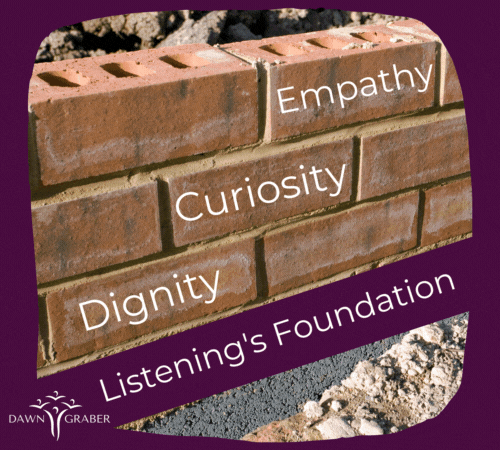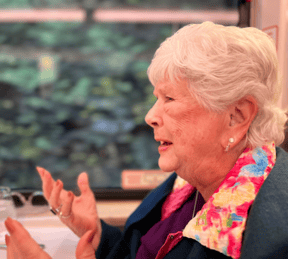Holiday Challenge: Listen Well
I challenge both you and myself this holiday season to listen more to loved ones, friends, and those relationships that can benefit all.
In my previous blog, Why is Listening So Hard, I shared that leaders struggle to listen well for at least six reasons:
- We think we don’t have time.
- We suffer from information overload.
- Too many of us are still influenced by the command-and-control leadership model.
- We have an inflated sense of our importance.
- We don't follow through with unfinished conversations.
- We think listening is an inherited human skill that we know how to do well enough, so we don't admit/ask for help in listening.
As we are in full holiday swing, the reasons for not listening well and remedies to do better also apply to our personal relationships. Plan now to commit to better listening over your holiday interactions.
Listening Well Begins With A Foundational Mindset
I believe there is a foundation that needs to be present for listening to flourish.

STEP ONE is the foundation that includes viewing the other as dignity-full and worthy of time and attention as a fellow human being. Author Donna Hicks, Ph.D., writes about the ‘dignity consciousness’ of each other and our perception of a higher power and purpose in her book, Leading with Dignity (2018). She reminds us that understanding grows and potential conflict becomes less ominous when we choose to see the value of the other simply because they, too, are human.
STEP TWO invites the uniqueness of the other to lead me into authentic curiosity. When showing up as my best self, I truly desire to learn about the person in front of me and from them. Therefore, I need to listen and ask many open-ended questions, which they then weave from where their heart is flowing, which shows me more of what makes them tick or is currently landing as significant for them.
STEP THREE wraps my listening foundation, helping me to create a pause that allows my heart to catch up to my judgey mind. Without empathy, it’s too easy for me to initially put the other in a particular box (they must believe ‘that’) and put up my guard preemptively to protect myself from an imagined injury. There is an inner child within the other, and my empathy chooses to remember that before they held the world on their shoulders, they were an effervescent child believing in their future selves. I listen easier when empathy swells within me as I first remember I have the privilege of interacting with another human being who is more uniquely wonderous than I can imagine.
How Do We Listen?
Mark L. Vincent, Ph.D., EPC, author of Listening, Helping, Learning, and Founder of Design Group International, codified listening into four competencies that work when practiced in our organizations and can help with our holiday conversations. Please see Mark’s comprehensive book full of case studies and how such listening can promote organizational cultures and their success. But knowing the holidays are upon us, let’s make these competencies practical even for the neighborhood party or family reunion. Having prepared to be an effective listener by building a foundation of dignity, curiosity, and empathy, enter conversations this holiday season by:
- Listening Actively and Comprehensively
- Listening Contextually
- Listening Architecturally
- Listen Adaptively
 Listening Actively & Comprehensively
Listening Actively & Comprehensively
One way we debunk time as an excuse for not listening well is simply living into that little extra time many of us have because of a slower work pace over the holidays. We can more easily sit still for 15 minutes or more and allow authentic curiosity to bloom for ourselves or relate to another. Our minds can hopefully be a little less full.
Plan unstructured time as often as you can throughout the holidays for listening opportunities to emerge. Sit with a loved one on the lanai with hot cocoa, cross-country ski with a friend, go out for coffee with a colleague, stare at the stars on the beach with yourself, or lie in your grandkids’ beds to create sacred space to invite another’s thoughts.
Listening is a top-tier gift of love this holiday season. We might agree upon screen-free zones over the holidays where people are fully present and can lean in and use their full bodies to show listening. We can model to the children how to take turns for members to respond to a prompt or share their updates without interruption. This will take a facilitator because family and friends are notorious for interrupting, and the introverts among you will quietly fade away from engaging in their time around the table.
 Listening Conceptually & Contextually
Listening Conceptually & Contextually
Use questions to understand more accurately what the speaker is describing to you. When someone starts spouting off about political preferences at Uncle Burt’s home, refrain from jumping to conclusions about what they mean before calmly asking for descriptions and examples. Double-check what another means when you hear an especially inflammatory statement.
When the adults are talking about critical race theory in the schools, and there’s an elementary teacher at the table, ensure the teacher’s understanding is invited. Ask, then listen and learn what they mean before deciding whether to share your opinion.
The children talk about Muffins with Mom and Donuts with Dad, Color Runs, and Field trips to places you’ve never heard of. They’d love to tell you about their lives, the holes in their heart, and their joys. What do they mean by the feelings expressed in their updates? What questions can you ask? One grandchild no longer wants to be known as the pirate kid; another no longer identifies with unicorns. Why? What in their world has changed that these childhood markers continue to evolve?
 Listen Adaptively
Listen Adaptively
Listening well means giving up control of how or where the conversation will go. We don’t listen well over the holidays because we enter the relationship interactions with an overinflated sense of our importance or responsibility to keep the family engaging well, inventing, implementing, and carrying out the plans (large and in charge command and control leadership).
In my case, I easily plan which game we’ll play as a family, how long we’ll watch old movies, and what fun field trip we’ll take. If I don’t include the family in our plans, take a poll, and listen for feedback on what activity they want to do after dinner, I am not listening adaptively. As a strong woman in my family, I can bulldoze through and make most of my plans happen for all of us. As I approach a weeklong holiday with 19 of us, I want to adapt readily and happily if my understanding of our group is different than I first thought or heard.
Listening adaptively means I will be willing to put my idea aside if the group feels differently. I will pull instead of push. Together we can morph the best ideas for all into our new reality. Listening adaptively means that our next moves may change based on what we hear this holiday season. Can you be willing to pivot even while on vacation?
Holiday Listening Charge
Over this holiday season, let’s commit to taking time with those closest to us to listen well. We will ask questions to understand. We will use what we hear to understand more fully new layers of intended meaning underneath their words. Then finally, we will hold our assumptions, our final interpretations, and ultimately our next steps loosely as we listen. We will listen, committed to seeing the dignity of the other, practicing curiosity in engaging with them, wrapping our listening in empathy, and knowing the speaker’s true essence desires to shine.
I wish you a meaningful and refreshing holiday season listening to yourself and those you love. I’d greatly value your listening stories from your holiday experiences. Drop me a line.

Some Listening Resources & Tools:
- Video: Brene Brown RSA Short: Empathy.
- Active Listening Games, Exercises, & Activities
- Conversation Games
- Listening Games for Adults
- Check out the coursework through The Society for Process Consulting and Listening’s 4 Core Competencies.
A Recent Read Worth Mentioning:
Hersey, T. (2022). Rest is Resistance: A Manifesto
Thank you, Noele Stith, Design Group International Partner, and colleague, for recommending this read. This book will challenge your understanding of working hard and make you reflect on the history of how privilege was afforded through “grind culture.” Do we live as if our worth comes from work? Are we defined as successful by only accomplishing? What place does rest have in reminding us we are enough as human beings? How do we create dream spaces so the most creative ideas can flow freely? Who wants to go to Tricia’s community nap experience? I do. I listened to it audibly, which I suggest because of the author’s poetic verse and passion in her reading.


December 8, 2022
Comments